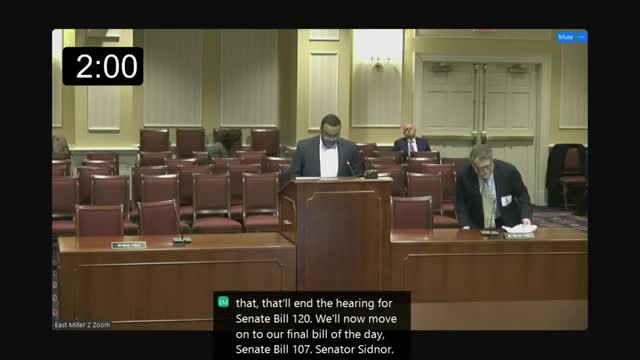Bill would allow fair-housing testers to record conversations despite Maryland's two‑party consent law, backers say it's essential evidence
Get AI-powered insights, summaries, and transcripts
Subscribe
Summary
Senate Bill 107 would create a narrow civil exception to Maryland’s two‑party consent rule to allow qualified fair‑housing testing organizations to record in‑person and telephonic tests; proponents said recordings are essential evidence, while opponents warned about privacy, oversight, and slippery-slope risks.
Senate Bill 107 would carve out a narrow exception to Maryland’s two‑party consent requirement to let qualified fair‑housing organizations record oral communications during housing‑testing activities, supporters told the Judicial Proceedings Committee.
Sponsor testimony from Sen. Charles Sidor described decades of volunteer testing experience and said recording tester interactions is critical because discrimination today is often subtle. "Testing is one of the most effective tools for combating subtle forms of discrimination," testified Fred Freyberg, who described decades of experience equipping testers and conducting investigations nationally. The Attorney General’s Civil Rights Division (represented by Jonathan Smith) supported the bill, saying recorded evidence often provides the best evidence for judges or juries and facilitates effective remediation.
Supporters emphasized limits in the bill: recordings would be permitted only when the tester is a party to the communication and only for the purpose of enforcing federal, state, or local fair-housing laws. Sponsor and witnesses noted the bill does not permit wiretapping of communications to which the tester is not a party. Several proponents encouraged the committee to clarify that related telephone calls and intercom communications are covered in addition to in‑person, oral communications.
Opponents, including the Maryland Multi‑Housing Association (represented by Aaron Greenfield) and a representative of Maryland Right to Life, argued the bill raises civil‑privacy concerns because it creates the first civil exception to a statute that previously provided exceptions primarily for criminal investigations and law-enforcement action. Opponents urged stronger oversight and training requirements and warned of potential misuse and the risk that testing programs could proliferate in ways that burden small "mom-and-pop" landlords.
Committee members extensively questioned witnesses about training, oversight, funding, and the possibility of limiting tests to established qualified fair‑housing organizations. Supporters said HUD has criteria for "qualified fair housing organizations" and that many testing programs operate under tight test‑coordinator supervision and standardized training. Witnesses said 39 states permit one‑party recording and that the U.S. Department of Justice conducts recordings nationwide under federal authority.
No committee vote was recorded. The committee asked proponents to provide drafting clarifications (for example, whether the bill’s phrase "oral communication" should include electronic communications such as telephone and intercom) and to address training, funding, and scope questions.
